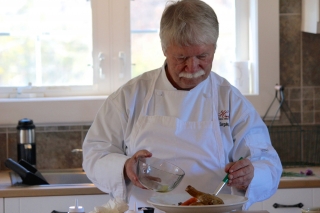
Facing the Admissions and Retention Challenge Head-on
28 March 2022It’s time for all faculty, staff and alumni to be a conduit in the admissions and retention processes.
By Paul Sorgule, MS, AAC
Feedback & comments: This email address is being protected from spambots. You need JavaScript enabled to view it.
We are facing a double-edged sword as the pandemic continues to raise havoc with education norms in culinary programs. The ability to attract enthusiastic, optimistic, committed students has become seriously challenging for admission departments and convincing students to stay engaged through program completion has never been more difficult.
The sizzle of a career as cook, chef and restaurateur has been dulled by many challenges: the awareness of a restaurant industry in crisis, chefs facing increasing difficulty finding staff, supply chain issues, sinking profit margins, and the realization that work in the food industry is hard and sometimes relentless.
Students have been pushed away from pursuing degrees because of COVID-19 protocols in classrooms and kitchens, limited use of on-campus restaurants due to health concerns, the rising cost of a culinary education, and fewer opportunities for in-person learning in labs and internships.
As much as we want to be altruistic about our role as educators, it is impossible to offer the type of program we know is necessary unless there are adequate numbers of committed students enrolling in and completing a program to support the high cost of delivery. There is an increased need to assess how these challenges are met as more and more culinary schools face declining enrollment and faltering retention numbers.
What is the answer? Those in enrollment management offices agree that for a college to succeed in its mission of preparing people for culinary careers, all stakeholders must actively engage in the admissions and retention processes. Teaching and training are not enough in today’s intense, ever-changing environment. Faculty, staff, administrators and alumni need to play a far more active role in helping the admissions office reach out, identify and encourage the most committed, passionate students to enroll in their programs. These same stakeholders must take retention seriously by listening to, observing and identifying triggers that might lead to student dropout and failure.
Potential student engagement is increased by visiting high schools, becoming a direct-line resource for prospective students, offering students opportunities to shadow classes, writing positive culinary blogs and effectively managing social media by creating in-house action videos. It is the personal connection a faculty member builds with students that hold the key to student success. The next generation of students will respond to one-on-one connections with faculty, administrators, alumni ambassadors and current students. This must become part of every stakeholder’s job description.
In the classroom, it will become increasingly important to be available to students and observant enough to determine when they need assistance and how each student might respond differently to your teaching method. At the same time, we should not waiver from classroom standards of excellence or have the highest performance expectations from those students. If we believe individuals want to excel and expecting excellence from them is setting the stage for self-motivation, then we will see improved results and greater levels of student self-esteem.
This is not a time to expect less. It is the most important time to expect more while providing the tools and support that make these expectations possible. Great teachers must be all-in if programs are to weather the storm and rise stronger than before. This is what your students expect and deserve. This is what it takes in today’s environment. Are you all in?
PLAN BETTER – TRAIN HARDER
Paul Sorgule, MS, AAC, president of Harvest America Ventures, a mobile restaurant incubator based in Saranac Lake, N.Y., is the former vice president of New England Culinary Institute and a former dean at Paul Smith’s College. Contact him at This email address is being protected from spambots. You need JavaScript enabled to view it..
